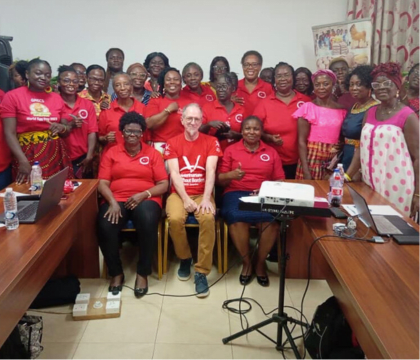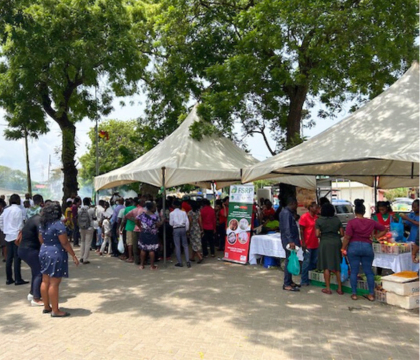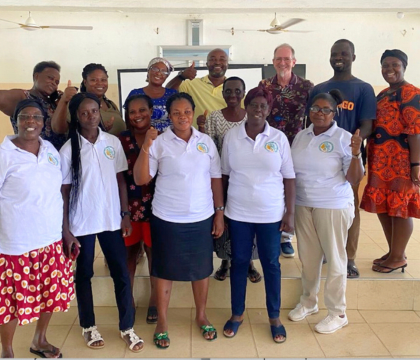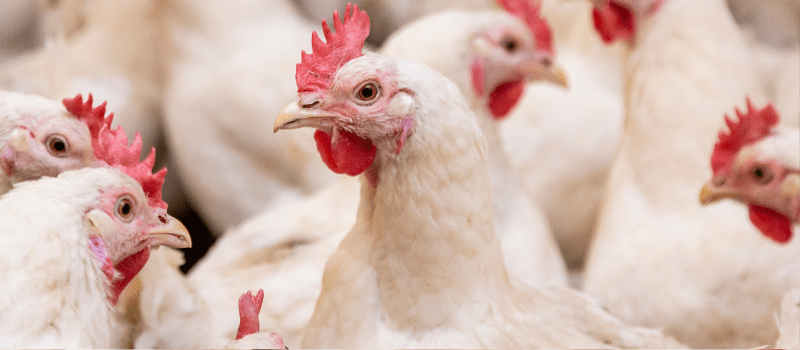#VETSVolunteerVoices brings you stories of our passionate VETS program volunteers from the field. This blog was written by Guy Audet, a Business Development Advisor who supported our VETS partner, Apex Body of Women in the Poultry Value Chain (WIPVaC-Apex) in Ghana earlier this year (March to May 2025).
Empowering Women Farmers in Ghana
Owning a business—from its creation to its growth and everyday management—requires tremendous energy and knowledge. The challenges are many, demanding both leadership and practical skills to navigate an environment that can be complex and always demanding.
This is especially true for women farmers in Ghana who raise poultry and produce eggs. Despite growing demand, access to the market remains extremely difficult for them. It’s flooded with low-cost imports, making it hard for small-scale producers to compete. Most farms in Ghana are modest in size, and the high cost of inputs puts them at a disadvantage compared to large companies.
My volunteer assignment in Ghana focused on providing technical support to help strengthen local agricultural entrepreneurship. The goal was to help women poultry producers improve how they manage their businesses—by building solid business plans that support both their current operations and long-term vision.
 PHOTO: Guy (front, center) at a training in Accra.
PHOTO: Guy (front, center) at a training in Accra.
 PHOTO: WIPVaC-Apex anniversary event in Accra.
PHOTO: WIPVaC-Apex anniversary event in Accra.
 PHOTO: Guy at a WIPVaC-Apex training in Somanya.
PHOTO: Guy at a WIPVaC-Apex training in Somanya.
Building Capacity for Competitive and Sustainable Agricultural Entrepreneurship
For several weeks, I worked with WIPVaC-Apex Ghana, an organization that brings together women involved in small-scale poultry production. As a business development advisor, my first step was to understand the economic environment in which these women operate, and identify ways to improve both their day-to-day operations and long-term prospects.
Next, I proposed practical, context-appropriate business tools—and delivered training to ensure the transfer of knowledge. Capacity building was at the heart of my assignment. But my work went far beyond technical training: it involved listening, co-creating, and sharing knowledge to equip these farmers for the long term. More importantly, it aimed to spark a transformation—helping them become true agents of change.
Structuring to Shape the Future
A business plan is a business plan—no matter where you are. But it’s essential to tailor it to its audience—whether that’s a microfinance organization, a bank, or the entrepreneur herself. The plan must help women strengthen their business management while articulating a clear path toward their vision.
The first step was to understand the environment these farmers operate in, and to explore their needs and aspirations. With them, I validated these expectations and developed tools that could truly make a difference in their businesses.
We also organized meetings with financial institutions. These gave the farmers a chance to ask questions directly and better understand what lenders require—and how to reflect those requirements in their business plans.
This work led to the creation of a tailored business plan template, accompanied by a guide to help them prepare and write it. We also developed a few sample business plans based on fictional poultry businesses to make research and writing easier.
Trainings followed in various regions of Ghana, covering all the key business components: project description, local market analysis, financial forecasting, marketing and sales strategies, and risk assessment. The aim was to provide producers with a concrete, practical tool for planning growth and approaching potential funders.
Sowing Change and Ensuring Long-Term Impact
A key part of my work was training WIPVaC-Apex’s leadership team and staff to ensure long-term knowledge sharing. These individuals act as liaisons to local groups, and building their capacity will allow the program’s impact to continue well beyond the initial workshops.
The goal was to leave behind a living, adaptable toolbox in the hands of local actors. That’s the true meaning of capacity building: not simply transferring knowledge to one person, but creating a ripple effect.
Celebrating Collective Strength and Inclusion
Conversations about business planning gave women producers a space to voice their challenges—and to recognize the power of group strength and collaboration. Throughout my assignment, I used a cross-cutting approach that was sensitive to both gender and the environment.
This wasn’t just about working with women—it was about recognizing the specific barriers they face: limited access to credit, heavy caregiving responsibilities, and economic marginalization. Our tools were designed to address these realities.
We also discussed environmental sustainability as part of our broader conversations.
One of the most powerful changes I witnessed was a growing confidence among the women. Whether drafting business plans alone or as a team, they began to formalize their projects, calculate their profitability, and speak with confidence about their enterprises. The trainings, tools, and one-on-one support helped catalyze a shift: they began to see themselves not just as poultry farmers—but as entrepreneurs.
My stay in Ghana was only a few weeks, but I hope that the tools, training, and structured plans we built together will continue to plant seeds of change for a long time to come.
VETS is an 8-year initiative (2020-2028) to improve the economic and social well-being of marginalized people, particularly women and girls, in 6 countries across Africa and Asia. In collaboration with local partners, the program is implemented through 190 Canadian volunteers on international assignment and is generously funded by Global Affairs Canada. Learn more.





